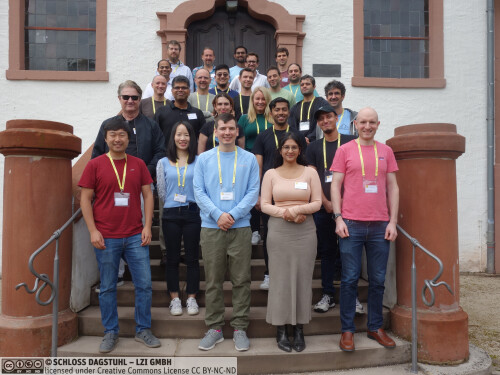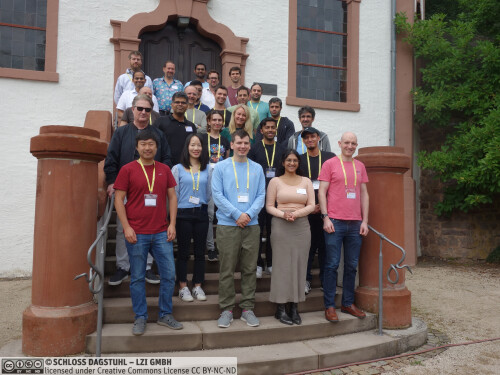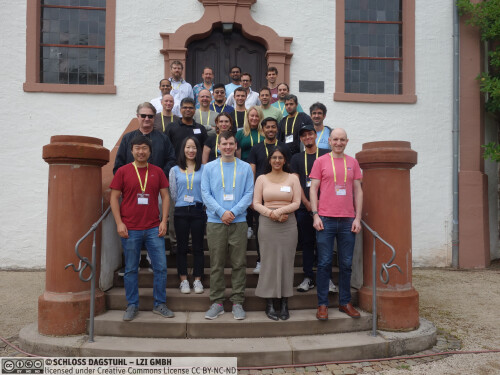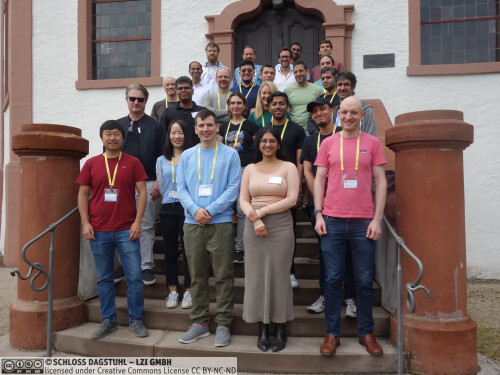Dagstuhl Seminar 24362
Next-Generation Secure Distributed Computing
( Sep 01 – Sep 06, 2024 )
Permalink
Organizers
- Christian Cachin (Universität Bern, CH)
- Aniket Kate (Purdue University - West Lafayette, US & Supra Research - West Lafayette, US)
- Julian Loss (CISPA - Saarbrücken, DE)
- Kartik Nayak (Duke University - Durham, US)
Contact
- Michael Gerke (for scientific matters)
- Simone Schilke (for administrative matters)
Schedule
This seminar was dedicated toward improving our understanding of techniques and models in the quickly evolving space of distributed systems, in particular as found in the blockchain space. This space intersects in various different areas such as applied cryptography, distributed algorithms, and game theory. As such, our seminar brought together researchers with a background in one or more of these areas to discuss with and learn from each other. Over the course of five days, the seminar participants gave talks about their respective areas followed by a discussion. The talks ranged from presenting recent results to summarizing the progress of a field over several decades.
While the talks took place in the morning sessions, the afternoon sessions were dedicated to breakout discussions on topics related to the talks and chosen by the seminar participants. During these sessions, topics were discussed in greater detail, which led to new insights and research questions. At the end of each seminar day, one of the discussion participants was tasked with summarising the outcome of the discussion to the other seminar participants. This often led to further discussion on some specific points.
Broadly speaking, the topics of these discussions can be summarized as follows.
Day 1: The discussions for day one were on topics related to the blockchain space. Three different groups discussed recent advancements in the area of consensus protocols, decentralization, as well as a discussion on rational actors storing secrets in the context of blockchain protocols.
Day 2: The second day of discussions focused on topics related to new/non-traditional network and fault models, gossip layers for spreading messages in blockchain systems, as well as further discussion on game theoretic aspects in distributed systems (again with a focus on blockchains).
Day 3: There were no afternoon discussions on day 3. Instead, the participants enjoyed an excursion to Saarschleife and a dinner at a local brewery in the evening.
Day 4: On day 4, one group discussed the difference in consistency guarantees provided by primitives such as modern blockchain protocols and classic primitives such as byzantine broadcast. Another group discussed the purpose of and possible applications of trusted execution environments for storing secrets in blockchain systems.
Day 5: The seminar ended by noon, hence there were no afternoon discussions on day 5.
 Julian Loss
Julian Loss
Trust in a single or a group of parties is fundamentally needed to design any secure system. A common approach to establishing this trust is to use secure distributed computing (SDC) protocols. In this approach, systems rely on multiple different communicating parties and the correct behavior of a subset of those. Several SDC primitives are used in practice underneath a wide array of other cryptographic primitives and applications. Examples include blockchains, decentralized oracles, random beacons, and primitives such as threshold signatures.
The formal models for such systems' security/correctness guarantees were introduced in the 80s and 90s and have been used ever since. However, ever-evolving software, (trusted) hardware, and communication infrastructure present new threats, attack vectors as well as opportunities that often fall outside the scope of these classical security models. Therefore, it is necessary to revisit and reevaluate these system models and threat assumptions in today's distributed systems context.
Moreover, tremendous growth in the cryptocurrency space demands high-performance solutions that scale to billions of users. It also introduces fascinating new challenges related to fairness, incentive compatibility, and crypto-economics that have received comparatively little attention in the existing literature.
This Dagstuhl Seminar will reveal and exploit synergies in the fields of cryptography, distributed computing, game theory, and systems to identify promising new application domains for SDC. These topics are directly motivated by discussion and collaborations with the blockchain industry as well as emerging IoT needs. The goal of this Dagstuhl Seminar is to bring together researchers from these distinct communities, identify gaps and overlaps, and foster future collaboration.
 Christian Cachin, Aniket Kate, Julian Loss, and Kartik Nayak
Christian Cachin, Aniket Kate, Julian Loss, and Kartik Nayak
- Ittai Abraham (Intel - Petah Tikva, IL) [dblp]
- Georgia Avarikioti (TU Wien, AT) [dblp]
- Renas Bacho (CISPA - St. Ingbert, DE) [dblp]
- Adithya Bhat (Visa USA - Foster City, US)
- Sourav Das (University of Illinois - Urbana-Champaign, US)
- Nico Döttling (CISPA - Saarbrücken, DE) [dblp]
- Sisi Duan (Tsinghua University - Beijing, CN) [dblp]
- Bryan Ford (EPFL Lausanne, CH) [dblp]
- Juan A. Garay (Texas A&M University - College Station, US) [dblp]
- Neil Giridharan (University of California - Berkeley, US) [dblp]
- Aniket Kate (Purdue University - West Lafayette, US & Supra Research - West Lafayette, US) [dblp]
- Aggelos Kiayias (University of Edinburgh, GB) [dblp]
- Andrew Lewis-Pye (London School of Economics & Political Science, GB) [dblp]
- Chen-Da Liu-Zhang (Hochschule Luzern - Rotkreuz, CH & Web3 Foundation - Zug, CH) [dblp]
- Giuliano Losa (Stellar Development Foundation - San Francisco, US) [dblp]
- Julian Loss (CISPA - Saarbrücken, DE) [dblp]
- Tal Moran (Reichman University - Herzliya, IL) [dblp]
- Kartik Nayak (Duke University - Durham, US) [dblp]
- Matthieu Rambaud (Télécom Paris, FR)
- Filip Rezabek (TU München - Garching, DE)
- Mohammad Sadoghi (University of California - Davis, US) [dblp]
- Alin Tomescu (Aptos Labs - Palo Alto, US) [dblp]
- Sophia Yakoubov (Aarhus University, DK) [dblp]
- Sravya Yandamuri (Duke University - Durham, US) [dblp]
- Fan Zhang (Yale University - New Haven, US) [dblp]
Classification
- Computer Science and Game Theory
- Cryptography and Security
- Distributed / Parallel / and Cluster Computing
Keywords
- Distributed Computing
- Cryptography
- Game Theory
- Blockchain





 Creative Commons BY 4.0
Creative Commons BY 4.0
